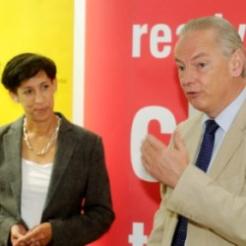Shaks Ghosh, chief executive of the Private Equity Foundation, listens to Francis Maude talking about Big Society Capital
Big Society Capital is the official new name for the Big Society Bank. The organisation aims to provide a flow of new capital to the charity and social enterprise sector. Vibeka Mair examines what this means in practice.
Big Society Capital’s (BSC) launch last month was a low-key affair, hosted at Whitehall by minister for the Cabinet Office, Francis Maude, and attended by a sprinkling of stakeholders. But those involved in the new organisation say it will create a revolution for the charity and social enterprise sector.
Nick O’Donohoe, a former senior director at J.P. Morgan, will be its first chief executive. He co-wrote the proposal for BSC with Sir Ronald Cohen, who started the impetus for the organisation ten years ago, when he led the social investment taskforce.
O’Donohoe does not have as long a commitment to social investment as Sir Ronald. But undertaking research for J.P. Morgan in the area over the past few years, and leading a social finance group at the investment firm, sparked his interest.
Big Society Capital will be a wholesaler, independent from government, which will provide capital to intermediaries such as Charity Bank and CAF. They, in turn, will then go on to provide capital to social organisations. Both BSC and the intermediaries will expect a return.
There will be a three-pronged structure. Big Society Capital will provide finance to intermediaries, the Big Society Trust will ensure BSC stays true to its mission, and the Big Society Foundation will receive any operating surplus from BSC.
Capital finance
However, there has been criticism by MPs and sector commentators about BSC’s structure. Many do not understand why BSC needs to operate through intermediaries, rather than funding the charity sector directly.
David Carrington, an independent consultant who is on the board of BSC, believes the confusion about its role arises as many don’t understand that BSC is not a supplier of new funding, but a new source of capital finance.
“There is a real confusion between revenue and capital,” he says. “The charity sector, except for the very old, large or endowed charities, is chronically undercapitalised for what it needs to do. It tends to be a sector where the finances are money-in and money-out. There is a focus on the short term.
“BSC is a direct challenge to traditional thinking about how you build a financially healthy sector and how you address this chronic undercapitalised nature of most charities, which would even be hard put to meet their redundancy obligations.
“They verge on the edge of insolvency an awful lot of the time and clearly do not have the capital reserves or resources of private organisations to invest in improving quality and growth.”
O’Donohoe adds that it was important that BSC did not compete with existing intermediaries and distort the market.
He says that sourcing finance from BSC will require a different approach by charities, which will need to demonstrate investment-readiness. He says BSC will work hand-in-hand with grantmakers to help charities with this, and hopes that foundations will become more willing to provide grants for this.
John Kingston, who will also be on the board of BSC, and is chairing the investment committee at the Big Lottery Fund which is making investments on BSC’s behalf while it awaits EU and FSA authorisation, adds that there is a huge latent demand for capital:
“What we are trying to do here is create demand by establishing a supply, in the knowledge that there is a huge latent demand. I think demand will go up gradually as organisations begin to realise that they have access to capital and give themselves more reserves.”
It was announced at BSC’s launch that the Private Equity Foundation (PEF) will be the recipient of the first investment of £1m. PEF will coordinate the proposed launch of a social impact bond, aiming to raise £2m to provide interventions for young people.
Ten years since it was originally envisaged, BSC is finally underway. Carrington believes the present government deserves credit for engaging actively with the proposals since coming into office.
However, Kingston adds that there is still a long way to go before social investment becomes mainstream: “I think we are talking about a 10-20 year role for BSC as the market goes from infancy to something more substantial.”









